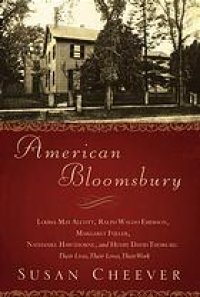
Ebook: American Bloomsbury : Louisa May Alcott, Ralph Waldo Emerson, Margaret Fuller, Nathaniel Hawthorne, and Henry David Thoreau : their lives, their loves, their work
Author: Alcott Louisa May, Cheever Susan, Emerson Ralph Waldo, Fuller Margaret, Hawthorne Nathaniel, Thoreau Henry David
- Tags: Au
- Year: 2007
- Publisher: Simon & Schuster Paperbacks
- City: Concord (Mass.), Massachusetts--Concord., USA
- Edition: First Simon & Schuster trade pbk. edition
- Language: English
- mobi
"Even the most devoted readers of nineteenth-century American literature often assume that the men and women behind the masterpieces were as dull and staid as the era's static daguerreotypes. Susan Cheever's latest work, however, brings new life to the well-known literary personages who produced such cherished works as The Scarlet Letter, Moby-Dick, Walden, and Little Women. Rendering in full color the tumultuous, Read more...
Abstract: "Even the most devoted readers of nineteenth-century American literature often assume that the men and women behind the masterpieces were as dull and staid as the era's static daguerreotypes. Susan Cheever's latest work, however, brings new life to the well-known literary personages who produced such cherished works as The Scarlet Letter, Moby-Dick, Walden, and Little Women. Rendering in full color the tumultuous, often scandalous lives of these volatile and vulnerable geniuses, Cheever's dynamic narrative reminds us that, while these literary heroes now seem secure of their spots in the canon, they were once considered avant-garde, bohemian, types, at odds with the establishment." "Far from typically Victorian, this group of intellectuals, like their British Bloomsbury counterparts to whom the title refers, not only questioned established literary forms, but also resisted old moral and social strictures. Thoreau, of course, famously retreated to a plot of land on Walden Pond to escape capitalism, pick berries, and ponder nature. More shocking was the group's ambivalence toward the institution of marriage. Inclined to bend the rules of its bonds, many of its members spent time at the notorious commune, Brook Farm, and because liberal theories could not entirely guarantee against jealousy, the tension of real or imagined infidelities was always near the surface." "Susan Cheerer reacquaints us with the sexy, subversive side of Concord's nineteenth-century intellectuals, restoring in three dimensions the literary personalities whose work is at the heart of our national history and cultural identity."--BOOK JACKET